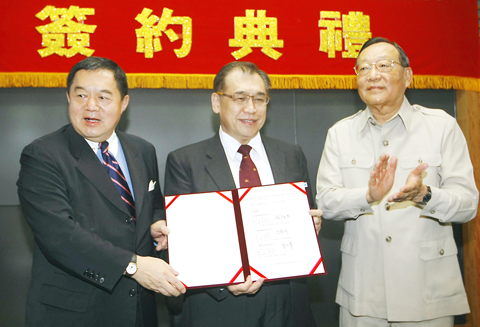State-run oil refiner CPC Corp, Taiwan (CPC, 台灣中油) yesterday inked an agreement with two local shipping companies to form a NT$29.7 billion (US$921 million) oil tanker venture, which is a part of CPC’s efforts to overhaul its aging fleet of oil vessels through cost-efficient approaches.
The new entity, Global Energy Maritime Co Ltd (環能海運), formed with private shipping companies U-Ming Marine Transport Corp (裕民航運) and Chinese Maritime Transport Ltd (CMT, 中國航運), would handle 40 percent of the 28 million tonnes of oil that CPC imports per year after completing its oil vessels.

PHOTO: CNA
To maintain cost flexibility, CPC rents vessels from other shipping companies to transport 60 percent of imported oil products and it hopes to keep the ratio unchanged in the future.
“The deal will help reduce the burden of national coffers and will also help CPC enter the oil shipping business without the operational limits that most state-run companies face,” CPC acting chairman Chu Shao-hua (朱少華) said.
CPC currently operates eight single-hull oil tankers and needs to revamp its aging fleet by 2015, when a new and stricter maritime rule takes effect and global oil tanker operators will have to upgrade their vessels to double-hull oil container ships to reduce the risk oil spillage during transportation, CPC vice president Lin Maw-wen (林茂文) said.
Global Energy Maritime, which is expected to begin operating next month, may order the first of six very large crude carriers and a small double-hull oil tanker by the end of this year, the statement said.
CPC declined to reveal the name of potential ship builders by saying that Global Energy Maritime’s board would make the decision as soon as possible. Global Energy Maritime plans to build or buy those oil tankers during the seven-year period between this year and 2016, according to the statement.
CMT chairman John Peng (彭蔭剛) yesterday said he would suggest ordering at least two vessels by year-end as shipbuilding costs have come down by between 35 percent and 50 percent over the past few years.
Peng also said now was the best time to invest.
“We have entered into this venture because of lower shipbuilding costs,” Peng said.
Last year, CMT replaced the nation’s No. 2 container shipping company, Yang Ming Marine Transport Corp (陽明海運), to become CPC’s new partner after Yang Ming pulled out of talks, which began in 2006, as it became more cautious about new investments amid the global economic recession.
CPC will be the biggest shareholder by owning a 48-percent stake in the Global Energy Maritime, while U-Ming Marine and CMT will hold 26 percent share each, according to a joint company statement.
The companies plan to arrange a syndicated loan of NT$19.7 billion to fund the formation of Global Energy Maritime.

NOT JUSTIFIED: The bank’s governor said there would only be a rate cut if inflation falls below 1.5% and economic conditions deteriorate, which have not been detected The central bank yesterday kept its key interest rates unchanged for a fifth consecutive quarter, aligning with market expectations, while slightly lowering its inflation outlook amid signs of cooling price pressures. The move came after the US Federal Reserve held rates steady overnight, despite pressure from US President Donald Trump to cut borrowing costs. Central bank board members unanimously voted to maintain the discount rate at 2 percent, the secured loan rate at 2.375 percent and the overnight lending rate at 4.25 percent. “We consider the policy decision appropriate, although it suggests tightening leaning after factoring in slackening inflation and stable GDP growth,”

DIVIDED VIEWS: Although the Fed agreed on holding rates steady, some officials see no rate cuts for this year, while 10 policymakers foresee two or more cuts There are a lot of unknowns about the outlook for the economy and interest rates, but US Federal Reserve Chair Jerome Powell signaled at least one thing seems certain: Higher prices are coming. Fed policymakers voted unanimously to hold interest rates steady at a range of 4.25 percent to 4.50 percent for a fourth straight meeting on Wednesday, as they await clarity on whether tariffs would leave a one-time or more lasting mark on inflation. Powell said it is still unclear how much of the bill would fall on the shoulders of consumers, but he expects to learn more about tariffs

Greek tourism student Katerina quit within a month of starting work at a five-star hotel in Halkidiki, one of the country’s top destinations, because she said conditions were so dire. Beyond the bad pay, the 22-year-old said that her working and living conditions were “miserable and unacceptable.” Millions holiday in Greece every year, but its vital tourism industry is finding it harder and harder to recruit Greeks to look after them. “I was asked to work in any department of the hotel where there was a need, from service to cleaning,” said Katerina, a tourism and marketing student, who would

i Gasoline and diesel prices at fuel stations are this week to rise NT$0.1 per liter, as tensions in the Middle East pushed crude oil prices higher last week, CPC Corp, Taiwan (台灣中油) and Formosa Petrochemical Corp (台塑石化) said yesterday. International crude oil prices last week rose for the third consecutive week due to an escalating conflict between Israel and Iran, as the market is concerned that the situation in the Middle East might affect crude oil supply, CPC and Formosa said in separate statements. Front-month Brent crude oil futures — the international oil benchmark — rose 3.75 percent to settle at US$77.01